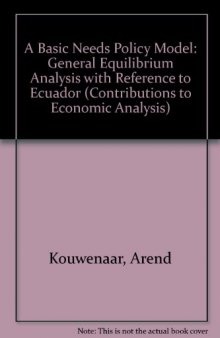 جزییات کتاب
جزییات کتاب
Using recent research on Ecuador, this book discusses a social accounting matrix (SAM)-based model for simulating the effects of basic needs policies on various socio-economic groups. Specific parameter choice and specification of relationships allow the general equilibrium model to capture rigidities and occurrences of non-perfect commodity and factor markets. Basic needs satisfaction is described as an ``output'' resulting from income formation and expenditure, and dynamically linked to the structural processes of household and socio-economic group formation, formation of the labour force and wealth, and labour productivity. Simulations concentrate on the effects of various expenditure, indirect tax and redistributive policies on incomes and basic needs satisfaction



 دانلود کتاب
دانلود کتاب

 جزییات کتاب
جزییات کتاب

 این کتاب رو مطالعه کردید؟ نظر شما چیست؟
این کتاب رو مطالعه کردید؟ نظر شما چیست؟
